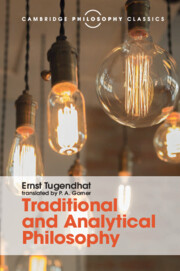Book contents
- Frontmatter
- Dedication
- Contents
- Preface
- Preface
- Translator's preface
- Part I Introduction: confrontation of analytical philosophy with traditional conceptions of philosophy
- 1 A question of method
- 2 A philosopher in search of a conception of philosophy
- 3 Ontology and semantics
- 4 Has formal semantics a fundamental question?
- 5 Consciousness and speech
- 6 The argument with the philosophy of consciousness continued
- 7 A practical conception of philosophy
- Part II A first step: analysis of the predicative sentence
- Bibliography
- Index of names
- Index of subjects
5 - Consciousness and speech
from Part I - Introduction: confrontation of analytical philosophy with traditional conceptions of philosophy
Published online by Cambridge University Press: 05 August 2016
- Frontmatter
- Dedication
- Contents
- Preface
- Preface
- Translator's preface
- Part I Introduction: confrontation of analytical philosophy with traditional conceptions of philosophy
- 1 A question of method
- 2 A philosopher in search of a conception of philosophy
- 3 Ontology and semantics
- 4 Has formal semantics a fundamental question?
- 5 Consciousness and speech
- 6 The argument with the philosophy of consciousness continued
- 7 A practical conception of philosophy
- Part II A first step: analysis of the predicative sentence
- Bibliography
- Index of names
- Index of subjects
Summary
If Aristotle or the tradition which followed him had taken veritative being as the guiding thread of their investigation, then there would have developed, within the framework of ontology, a semantics of the assertoric sentence-form. Instead of this, however, the problematic, which Aristotle had at least touched upon, became unrecognizable in the shape of the inadequate doctrine of the verum as another ‘transcendental’ determination of ens, together with unum and aliquid, a doctrine in which the veritative meaning of ‘is’ was assimilated to the others and thereby finally objectified. Moreover for mediaeval ontology the starting-point for the demonstration of the universality of being was no longer the usage of ‘is’ but the thesis that the determination ens is the first determination that is given to the mind. How this proposition, which, to the impartial observer, must appear far from evident, indeed unintelligible, could be regarded as supremely evident by an entire tradition, can be explained only by reference to the concept of representation (Vorstellen) which I shall examine at the end of this lecture.
Where the Aristotelian ontology, and indeed the entire traditional ontology from Parmenides to Hegel, came closest to veritative being was in the assumption that the question of being is always connected with the question of not-being. How far from obvious this is can be seen immediately one considers that a theory which started out from objects or from that mediaeval conception of ens would have no occasion to thematize the ‘not’. The opposition of being and not-being is (as we could already see in connection with the Principle of Contradiction) an opposition that belongs to veritative being just as much as the so-called modalities of being; and other meanings of ‘is’ (such as that of the copula or existence) only participate in this opposition because they are species of veritative being. On the other hand, our traditional orientation towards the opposition being not-being contributes to our tendency to place denial on a level with affirmation and to overlook the peculiar status of the ‘not’ in the sentence-form.
What we were able to achieve in the previous lecture in connection with veritative being was a formal characterization of all assertoric sentences.
- Type
- Chapter
- Information
- Traditional and Analytical PhilosophyLectures on the Philosophy of Language, pp. 51 - 67Publisher: Cambridge University PressPrint publication year: 2016



